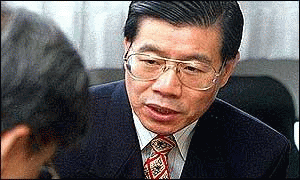In our story, what happened to Yang Jianli? The Boston Globe reports:
"Yang said he was provided rice and tea and held for two hours before Chinese authorities put him on a plane back to Taipei.'They treated me OK,' he said. 'They just wouldn't answer any questions.'"
So, there was violation of the UN Universal Declaration of Human Rights, because Yang was refused entry. But it seems that Chinese authorities were somewhat considerate as they arranged his exit flight, and provided rice and tea during the interval between flights.
Now consider, on his attempted return to China, what happened to Zhou Yongjun. He was grabbed by authorities, thrown in the slammer, and held secretly without charges -- perhaps even tortured -- for seven and a half months. This was not the matter of politely serving rice and tea.
Why isn't Zhou on a plane to Taiwan? He is still being held by Chinese jailers, and now they have concocted some trumped-up charges, as they always do for political dissident prisoners. Chinese law says that families must be immediately notified upon the arrest of a family member. This did not happen while Zhou's family endured seven and a half months of uncertainty in his case.
So, there was violation of the UN Universal Declaration of Human Rights, but also violation of Chinese law by its own authorities. Two U.S.-based dissidents each attempted a return to China (and in Zhou's case, it was to visit his elderly parents and his ailing father). One gets tea and a plane ticket, the other gets incarceration and mistreatment. What accounts for the difference in handling these two cases?
The Chinese government could just as easily have refused entry to Zhou in the way that they refused it to Yang. They would still be violating human rights, but at least there would not be an ongoing diplomatic incident in the middle of 20th anniversary commemorations for Tiananmen Square. I can repeat what I told the AFP:
"It is exceedingly bad form for the Chinese government to create a new Tiananmen-related controversy at the very time that world attention is turning to the 20th anniversary of Tiananmen Square."
Yes, Virginia, the Chinese government is mishandling the case of Zhou Yongjun. In fact, let's consider what else I told the AFP:
"Zhou was stopped when entering China. So, he could not have committed any crime within Chinese jurisdiction. The government's charges are simply not credible."
That's just it. The government lacks credibility in its story. As mentioned, Zhou has been living and working in the United States, where he has permanent residency and two children. If he was stopped upon entry to Chinese territory, then how is it plausible that he could have committed any crime whatsoever on Chinese territory? He could not.
The government's less-than-credible charges are made less credible because they have changed. At first, the government was saying "spying," "espionage," and "political crimes." Those are stock answers, often applied to political dissidents. More recently, the government's charge has changed to "financial fraud." That suggests to me that the evidence was too thin to back up charges of spying, espionage, and political crimes. And, because the world has a recent financial meltdown, and it is suddenly popular to hate financial fraudsters, perhaps the government thinks, "Gee, let's blame it on Majer Zhou." (Majer Zhou is the English name for Zhou Yongjun. Pronounce "Major Joe.")
Zhou is not a credible scapegoat for the state of the economy, and we have seen this kind of behavior from the Chinese government before. After the 9/11 attacks made everyone focus on terrorism, then the charge of "terrorism" became trendy for China to apply to political dissidents such as Wang Bingzhang, another U.S.-based dissident whom the Chinese authorities are still holding today, six years after they sentenced him to lifetime imprisonment.
Wang Bingzhang
The legislatures of Canada and the U.S. have called for the release of Wang Bingzhang, and if China continues holding Zhou Yongjun, then legislative initiatives on his behalf are an upcoming next step. Zhou had applied for U.S. citizenship; I will suggest that the U.S. Congress pass a bill giving him citizenship in absentia. This type of tactic has been employed before in efforts to free prisoners of conscience.
HILLARY CLINTON MUST RESIGN
(Note: You can view every article as one long page if you sign up as an Advocate Member, or higher).





